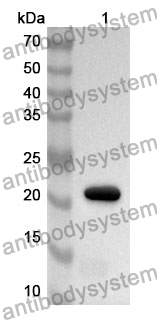Catalog No.
PHE02001
Species reactivity
Human
Host species
Rabbit
Isotype
IgG
Clonality
Polyclonal
Immunogen
E. coli - derived recombinant Human CD153/TNFSF8 (Leu60-Ile227).
Tested applications
ELISA: 1:4000-1:8000, IHC: 1:50-1:100, WB: 1:1000-1:4000
Target
CD153, CD30-L, CD30L, Tumor necrosis factor ligand superfamily member 8, TNFSF8, CD30LG, CD30 ligand
Purification
Purified by antigen affinity column.
Accession
P32971
Applications
ELISA, IHC, WB
Form
Liquid
Storage buffer
0.01M PBS, pH 7.4, 50% Glycerol, 0.05% Proclin 300.
Stability and Storage
Use a manual defrost freezer and avoid repeated freeze thaw cycles. Store at 2 to 8°C for frequent use. Store at -20 to -80°C for twelve months from the date of receipt.
Generation of antagonistic biparatopic anti-CD30 antibody from an agonistic antibody by precise epitope determination and utilization of structural characteristics of CD30 molecule., PMID:39958564
CD30 influences germinal center B-cell dynamics and the expansion of IgG1-switched B cells., PMID:39420111
Elevated IL-15 levels in systemic lupus erythematosus: potential pathogenesis insight and therapeutic target., PMID:39217881
CD4+CD57+ senescent T cells as promoters of systemic lupus erythematosus pathogenesis and the therapeutic potential of senolytic BCL-2 inhibitor., PMID:38752316
Protocol for the isolation of mouse senescence-associated CD4+ T cells using flow cytometry and functional assays., PMID:37515759
Optimizing assessment of CD30 expression in Hodgkin lymphoma by controlling for low expression., PMID:37377225
Elevated CD153 Expression on Aged T Follicular Helper Cells is Vital for B cell Responses., PMID:36993647
cis interaction of CD153 with TCR/CD3 is crucial for the pathogenic activation of senescence-associated T cells., PMID:36130493
Antiaging Vaccines Targeting Senescent Cells., PMID:35081729
The CD153 vaccine is a senotherapeutic option for preventing the accumulation of senescent T cells in mice., PMID:32424156
Alterations in immune and renal biomarkers among workers occupationally exposed to low levels of trichloroethylene below current regulatory standards., PMID:30971425
Severe Progressive Mycobacterium avium Complex Infection Associated With Brentuximab Vedotin Therapy., PMID:30423147
CD30 Is Highly Expressed in Chronic Obstructive Pulmonary Disease and Induces the Pulmonary Vascular Remodeling., PMID:29984229
Correlates of immune exacerbations in leprosy., PMID:29950273
Tumor-stage mycosis fungoides in palmoplantar localization with large-cell transformation and partial CD30 expression shows complete response to brentuximab vedotin., PMID:29512830
The role of CD30 and CD153 (CD30L) in the anti-mycobacterial immune response., PMID:28061955
Osteopontin in Spontaneous Germinal Centers Inhibits Apoptotic Cell Engulfment and Promotes Anti-Nuclear Antibody Production in Lupus-Prone Mice., PMID:27534552
CD30 in systemic mastocytosis., PMID:24745678
Protrusion-guided extracellular vesicles mediate CD30 trans-signalling in the microenvironment of Hodgkin's lymphoma., PMID:24659185
CD30L/CD30 is critical for maintenance of IL-17A-producing γδ T cells bearing Vγ6 in mucosa-associated tissues in mice., PMID:23549449
Lymphocyte deficiency limits Epstein-Barr virus latent membrane protein 1 induced chronic inflammation and carcinogenic pathology in vivo., PMID:21291541
CD30 ligand is a target for a novel biological therapy against colitis associated with Th17 responses., PMID:21068411
Site-specific, covalent labeling of recombinant antibody fragments via fusion to an engineered version of 6-O-alkylguanine DNA alkyltransferase., PMID:19388673
Rapid induction of OX40 ligand on primary T cells activated under DNA-damaging conditions., PMID:18718855
ADAM10 inhibition of human CD30 shedding increases specificity of targeted immunotherapy in vitro., PMID:17210715
Direct evidence for a critical role of CD30 in the development of allergic asthma., PMID:17030250
Deciphering CD30 ligand biology and its role in humoral immunity., PMID:16771849
Mast cells enhance T cell activation: importance of mast cell costimulatory molecules and secreted TNF., PMID:16455980
Various costimulatory pathways are essential for induction of regulatory cells by intratracheal delivery of alloantigen., PMID:15919509
Herpes simplex virus-induced, death receptor-dependent apoptosis and regression of transplanted human cancers., PMID:15596049
CD30/CD30 ligand (CD153) interaction regulates CD4+ T cell-mediated graft-versus-host disease., PMID:15322151
Contribution of CD30/CD153 but not of CD27/CD70, CD134/OX40L, or CD137/4-1BBL to the optimal induction of protective immunity to Mycobacterium avium., PMID:15316035
Extremely rapid and intense induction of apoptosis in human eosinophils by anti-CD30 antibody treatment in vitro., PMID:14764685
CD30 antigen: not a physiological marker for TH2 cells but an important costimulator molecule in the regulation of the balance between TH1/TH2 response., PMID:14551032
CD27/CD70, CD134/CD134 ligand, and CD30/CD153 pathways are independently essential for generation of regulatory cells after intratracheal delivery of alloantigen., PMID:14501851
Proliferation of CD30+ T-helper 2 lymphoma cells can be inhibited by CD30 receptor cross-linking with recombinant CD30 ligand., PMID:12855655
Selective inhibition of class switching to IgG and IgE by recruitment of the HoxC4 and Oct-1 homeodomain proteins and Ku70/Ku86 to newly identified ATTT cis-elements., PMID:12672812
Mast cell infiltration correlates with poor prognosis in Hodgkin's lymphoma., PMID:12358914
Expression of tumor necrosis factor ligand superfamily costimulatory molecules CD27L, CD30L, OX40L and 4-1BBL in the heart of patients with acute myocarditis and dilated cardiomyopathy., PMID:12031769
Soluble CD30 binds to CD153 with high affinity and blocks transmembrane signaling by CD30., PMID:11754357
Human angiogenin fused to human CD30 ligand (Ang-CD30L) exhibits specific cytotoxicity against CD30-positive lymphoma., PMID:11751393
Expression of tumour necrosis factor (TNF) ligand superfamily co-stimulatory molecules CD30L, CD27L, OX40L, and 4-1BBL in murine hearts with acute myocarditis caused by Coxsackievirus B3., PMID:11745696
CD30L up-regulates CD30 and IL-4 expression by T cells., PMID:11728464
Progression of lymphomatoid papulosis to systemic lymphoma is associated with escape from growth inhibition by transforming growth factor-beta and CD30 ligand., PMID:11594583
Mast cells express functional CD30 ligand and are the predominant CD30L-positive cells in Hodgkin's disease., PMID:11552987
Dysregulation of CD30+ T cells by leukemia impairs isotype switching in normal B cells., PMID:11175813
Alterations in CD30(+) T cells in monoclonal gammopathy of undetermined significance., PMID:11237552
Autocrine growth regulation of CD30 ligand in CD30-expressing Reed-Sternberg cells: distinction between Hodgkin's disease and anaplastic large cell lymphoma., PMID:10908157
Engagement of CD153 (CD30 ligand) by CD30+ T cells inhibits class switch DNA recombination and antibody production in human IgD+ IgM+ B cells., PMID:10878352
Characterization of the CD30L binding domain on the human CD30 molecule using anti-CD30 antibodies., PMID:10768840


